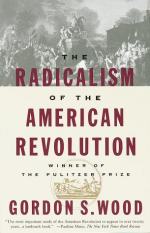|
This section contains 793 words (approx. 2 pages at 400 words per page) |

|
Authority
In the English-speaking world prior to the 18th century, all authority rests in the divinely anointed monarch (the "single principle"), to whom every subject, noble or common, owes allegiance and to whom he dispenses privileges. Everyone in society is under someone's direct authority and owes him allegiance and receives in return privileges. There are multiple deep hierarchies of ecclesiastical and civil authorities. At the base of the pyramid, fathers have absolute authority over wives, children and extended households; including, servants and slaves.
After Parliament kills a tyrant king (Charles "the Martyr" in 1649) and brings in a new dynasty in the Glorious Revolution of 1688 and 1714, absolute divine right becomes an indefensible theory, and in some minds the king is reduced to the function of the ultimate disinterested leader or "sovereign umpire" of a realm that is more commonwealth than monarchy. Radicals hold the people possess the authority to establish...
|
This section contains 793 words (approx. 2 pages at 400 words per page) |

|




